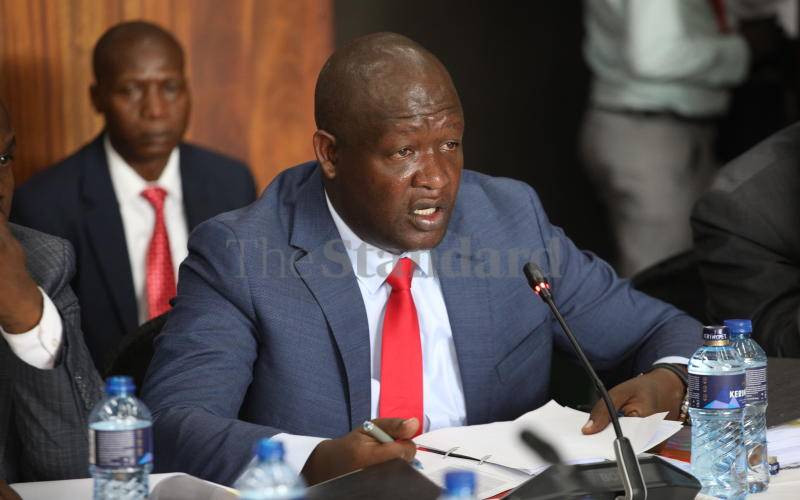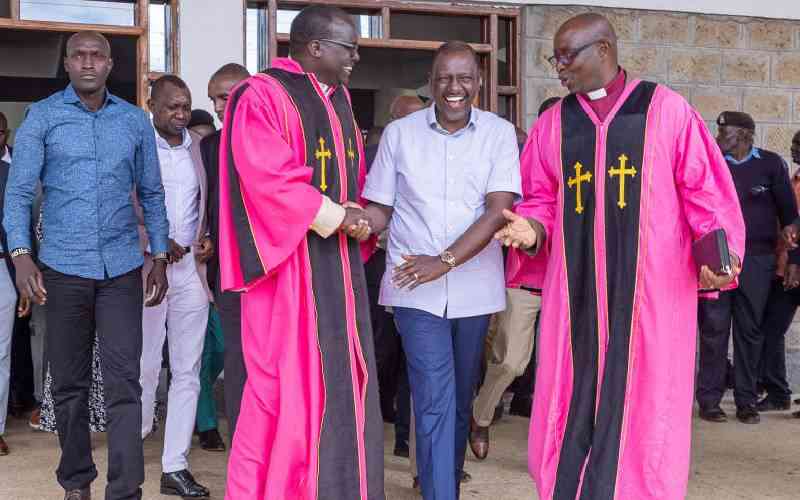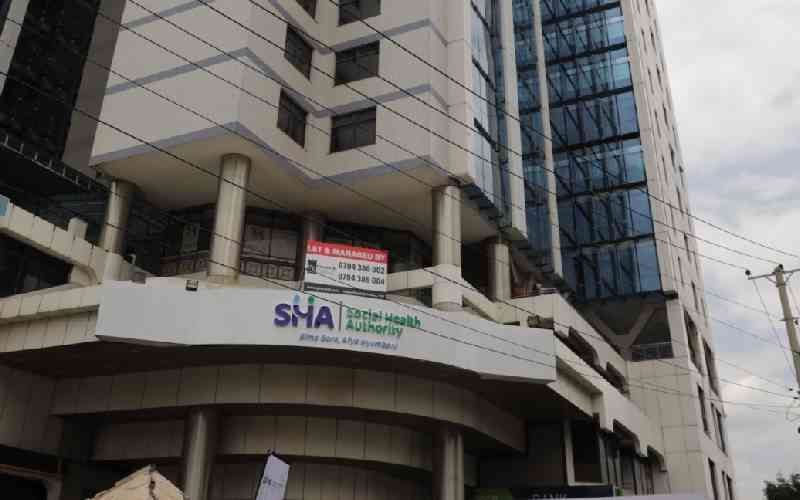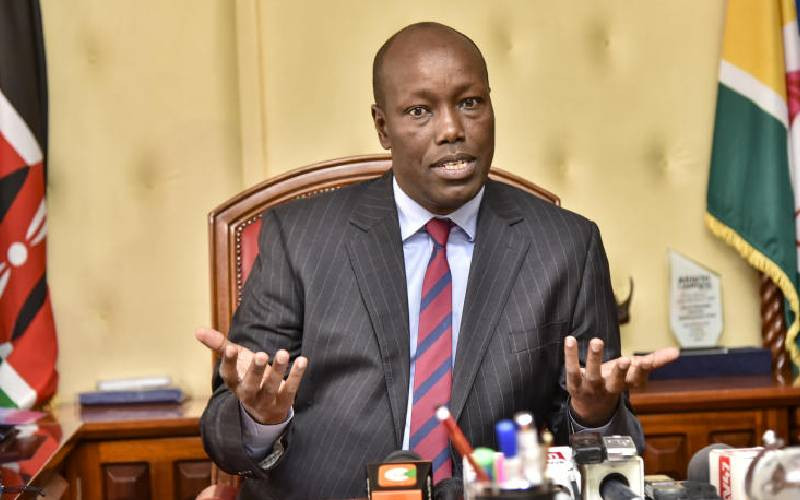
The history of Ndabibi ADC Farm in Nakuru dates back to pre-colonial days but it has since the 1990s been engulfed in controversy as top politicians, military and judiciary officers, among others scrambled to get a piece of the prime land.
The latest is the saga over 5,000 acres parcel of land pitting Ndibithi Farmers Company and an unidentified owner, resulting in the arrest of its director Edward Maina who was arraigned in court alongside a blogger, Reuben Gitau, charged with incitement and malicious damage to property.
Two weeks ago, 19 suspects were arrested and arraigned in the Milimani Law courts where they were charged with invading the farm and destroying pa fence worth over Sh2 million.
They bring to at least 100, the number of people have been arrested since December 2023, and charged in courts outside Nakuru County for allegedly invading private land and destroying property.
The tussle would have passed as one of the many land disputes that dot the country had Naivasha MP Jayne Kihara not sensationally claimed that the owner is, indeed, President William Ruto.
Speaking at a charged meeting at the Gathundia trading centre last week, which was convened to discuss the thorny issue, Kihara declared those claiming ownership as imposters with no genuine documents.
She called on the residents to respect President Ruto, and dared anybody with a legitimate claim on land in Ndabibi ADC Farm and whose land had been grabbed by the President to step forward. None did.
- Human cases of bird flu 'an enormous concern': WHO
- WHO confirms first fatal human case of H5N2 bird flu
- WHO: First human case of H5N2 bird flu died from multiple factors
- Death of intern doctor points out unresolved health sector issues
Keep Reading
Neither the President nor the State House have responded to Kihara's claims, but it has caused more confusion in the saga surrounding the ownership of the land.
Apart from Ndibithi, other groups that claim to have lost land they bought from Agricultural Development Corporation (ADC) include Mwana Mwireri Farmers Company Society and New Matanya.
Ndibithi was formed by former workers of the original owner of the land, measuring 40,000 acres, Mr Gilbert Coville, a British settler, to enable them to acquire a portion of the land.
Mr Coville, possessed five properties including Kikopey ranch, all totaling 265,000 acres.
The land he owned spread in Naivasha, Gilgil and Rumuruti in Laikipia County.
Lariak ranch in Laikipia, the largest of his property, measured 160,000 acres.
The rancher, who was regarded as one of the wealthiest and most powerful landowners in Kenya, had a herd of 20,000 indigenous cattle.
He was among the founders of the Kenya Meat Commission together with Lord Delamere, among other influential settlers.
In 1943, Coville married Lady Diana Delves Broughton, who was later married to Tom Delamere.
Coville died in 1966, but in his will, which he deposited with Dentons Hamilton Harrison and Mathews Advocates, he had expressed his desire to have some of his workers allocated land in Ndabibi Ranch.
Lady Diana inherited Coville's property and that of Tom Delamere, upon his demise.
The white settler had promised his workers land and had indicated the same in his will
The former employees were required to raise Sh200,000 to cater for the cost of the transfer of land and infrastructural development on the land.
The farms' hands initially raised Sh40, 000 leaving a balance of Sh160, 000. This was done in the early 1970s.
This prompted Lady Diana Delamere to secure a mortgage, which she transferred to the farm hands and which they repaid before being allocated their portion.
The farmers had engaged Olweny Surveyors in the early 1980s to subdivide the 5,000-acre land, which is now in contention, leaving 1,000 acres intact for communal farming to repay the loan.
However, Ndabithi claims ADC management grabbed the land sold it to Mwana Mwireri and the former Education Permanent Secretary Benjamin Kipkulei.
In total, Kipkulei came to own 2,500 acres of Ndibithi land.
However, the ownership of the land took a new twist in August last year when Naivasha High Court judge Lynette Omollo declared that neither of them to could prove ownership of the land leaving its ownership in limbo.
In the tussle between him and Ndibithi, Kipkulei had told the court that he bought the land in 2007 from various individuals, who had been allotted the property by ADC. In total, he owned six parcels of land but was not sure of their total size.
Ndibithi and three of its officials, Edward Maina, Jane Maina and Moses Gakinya, on their part, stuck to their guns that they own the land, having bought from Coville.
They told the court that received a title deed for the land in 1974.
Kipkulei had moved to court seeking seeking compensation from Ndibithi for trespass and destruction of property.
Ndibithi, on its part, held that the former PS had obtained the land through fraud.
Justice Omollo ruled both parties had not given sufficient evidence to prove ownership.
Efforts to resolve the disputes over land in Nakuru have over the years proved futile.
Among those who have attempted to intervene are former Nakuru governors Lee Kinyanjui and his predecessor Kinuthia Mbugua as well as former Rift Valley Regional Commissioner George Natembeya.
ADC has always insisted that the land was illegally grabbed by the farmers groups and other private developers.
Last year, ADC managing director Mohamed Bulle said that the corporation had recovered 3,000 acres that had been grabbed by different groups in the ADC Ndabibi Farm.
Bulle, who was appearing before the National Assembly Public Investment Committee on Social Services, Administration and Agriculture, said ADC had lost massive tracts of land to individuals backed by previous regimes.
He named former Treasury PS, Charles Mbidyo, as having acquired 10,000 acres of the corporation's land while former University of Nairobi Vice-Chancellor Prof Philip Mbithi had acquired 3,000 acres.
Mr Bulle told the committee that there were instances where the National Land Commission had allocated ADC land to squatters and the courts ruled in favour of the squatters whenever ADC filed court cases.
Tetu MP Geoffrey Wandeto, who is a member of the committee, called for the formation of a commission of inquiry to investigate into the grabbing of ADC land.
The committee, chaired by Nvakholo MP Emmanuel Wangwe, heard that ADC owned over 1.8 million acres of land in different parts of the county.
The parliamentary committee pledged to carry out a special audit of all land belonging to ADC in a bid to repossess it.
It was also recommended that those who had illegally acquired it pay for the time they had utilized it.
The committee also demanded that all ADC land illegally allocated to powerful individuals in the Kanu regime be reposessed.
In September 2023, the government formed a task force to inquire into the status of land owned by the ADC.
The committee draws its members from the office of the president, the National Land Commission, and the ADC management.
The ongoing saga brings to mind how ADC, which owned huge tracts of land across the country, started losing it in the early 1990s, when the government delineated for purposes of settling landless people only for it to end up in the hands of influential personalities in the then Kanu regime.
For instance, ADC lost 32,000 acres of land in Ngata ADC Farm on the outskirts of Nakuru town, which was sub-divided and allocated to prominent individuals.
In the mid-1990s, then President Moi ordered that 10,000 acres of land be hived from the ADC farm for resettlement of members of the Kikuyu, Maasai and Kalenjin communities.
They were victims of the 1992 politically-instigated ethnic clashes that rocked parts of Rift Valley Province.
Members of the Kikuyu community, who had been uprooted from their farms in Enoosupukia in Narok County, were settled at the Moi Ndabi phase one, with the Maasai community and the Kalenjins settled in phases two and three respectively.
 The Standard Group Plc is a multi-media organization with investments in media platforms spanning newspaper print
operations, television, radio broadcasting, digital and online services. The Standard Group is recognized as a
leading multi-media house in Kenya with a key influence in matters of national and international interest.
The Standard Group Plc is a multi-media organization with investments in media platforms spanning newspaper print
operations, television, radio broadcasting, digital and online services. The Standard Group is recognized as a
leading multi-media house in Kenya with a key influence in matters of national and international interest.











